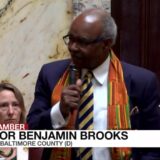Raids for delta-8 and delta-10 started on 4/20.
CBD shops in Topeka, Kansas, have been raided over the last week and a half, with law enforcement targeting hemp-derived THC. But shop owners say their products are legal according to state and federal law.
Raids Start on 4/20
Topeka police searched Guardian Recreational Cannabis Dispensary April 20, making an arrest as part of what they called an “active investigation,” reported Topeka’s 27 News.
Then, April 28, the Shawnee County Drug Enforcement Task Force raided more Topeka CBD shops, seizing hemp-derived THC products.
The owner of two CBD American Shaman locations told 27 News deputies had seized about $20,000 worth of product. Another shop owner told the station officers seized about 80 percent of inventory, worth about $10,000 to $15,000. They also said the products at their store, CBD Sacred Leaf, were compliant with Kansas Law.
The Shawnee County Sheriff’s Office issued a media release the same day confirming it had executed search warrants on multiple retailers in the county.
“Task Force officers seized illegal products that were being offered for sale and distributed to the general public,” the release read. “These unlawful products, in various forms and packaging, were identified as Delta-8 THC, Delta-9 THC and Delta-10 THC products that have been determined to be unlawful schedule I drugs under Kansas law.”
“These unlawful products, in various forms and packaging, were identified as Delta-8 THC, Delta-9 THC and Delta-10 THC products that have been determined to be unlawful schedule I drugs under Kansas law.”
— Shawnee County Sheriff’s Office
They did not close any of the businesses or make any arrests during the searches, according to the release. The sheriff’s office said each retailer had been served a cease-and-desist notice warning them to stop to the sale of all THC products.
One Shop Calls on AG to Reverse Opinion
Guardian, the shop raided on 4/20, has secured legal representation. And they’re calling the raids illegal, saying they were based on misguided information from the Kansas attorney general, reports the Topeka Capital-Journal.
Quick background: The AG’s Office issued an opinion last December calling delta-8 THC “unlawful to possess or sell” beyond trace concentrations of 0.3%.
Delta-8 THC has a chemical structure similar to that of delta-9 THC, the most abundant form of naturally-occurring THC. Like delta-9, it has a psychotropic effect — though users report it’s potency is milder.
Unlike delta-9, it’s sourced from hemp and is not banned at the federal level. State laws vary, but Kansas lawmakers haven’t explicitly made THC isomers like delta-8 and delta-10 illegal. Delta-9 THC is illegal in Kansas, a state with no medical cannabis program (though a bill appears close to passing) and recreational prohibition in full effect.
When it comes to delta-8 in Kansas, Guardian representatives are saying the AG misrepresented federal law.
In an April 25 letter to Kansas Attorney General Derek Schmidt, Guardian noted that the 2018 federal Agriculture Improvement Act says, “Any and all parts thereof derived from industrial Hemp are Hemp and are legal.”
“We have drafted you this letter to let you know of the mistake your office has made with regards to mis quoting the Federal law,” the letter reads, “and adding confusion to the mix by adding in dozens of Kansas Statutes that you claim surround the legality of Hemp in Kansas BUT, in fact there is NO law in Kansas that actually controls the HEMP business … .”
“We have drafted you this letter to let you know of the mistake your office has made with regards to mis quoting the Federal law, and adding confusion to the mix by adding in dozens of Kansas Statutes that you claim surround the legality of Hemp in Kansas …”
— Letter from Guardian Recreational Cannabis Dispensary to the Kansas Attorney General
Further, they noted in the letter, hemp-derived THC isomers are not on the federal list of controlled substances.
The author of the (unsigned) letter asked Schmidt to hold a press conference reversing the December opinion. Will that happen? Doesn’t sound likely.
John Milburn, a spokesman for the attorney general’s office, told the Capital-Journal the office was standing by the December opinion and had no additional comment. Milburn added: ”As is always the case, individuals who would like to advocate for a change in the law may contact their legislators.”
A bill that would have clarified that hemp-derived THC is legal, House Bill 2706, stalled in the most recent legislative session.
The AG’s December opinion has prompted action elsewhere in the state. Johnson County District Attorney Steve Howe announced Feb. 22 that his office had begun issuing written notices advising businesses of a March 20 deadline to stop selling delta-8 products.




















